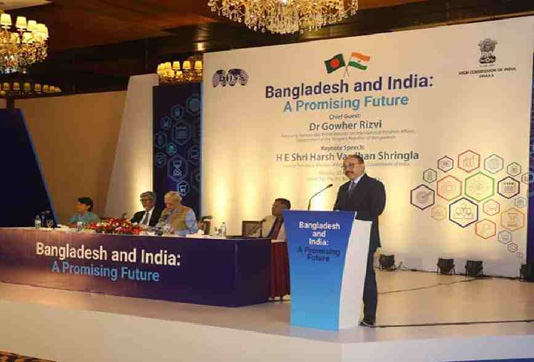DHAKA, March 2, 2020 (BSS) – Indian Foreign Secretary Harsh Vardhan Shringla today said New Delhi was expected to finalise proposed deals with Bangladesh on seven common rivers excepting the Teesta by the yearend.
“We need to expedite harmonization these (water flow) data (of seven rivers) so that water sharing can be finalised as early as possible . . . possibly within this year,” he said while addressing as the keynote speaker at a seminar on Bangladesh-India relations at a Dhaka hotel.
But he appeared to be uncertain about the deal on major Teesta river saying an agreement on water sharing of this particular stream could only be finalized on the basis on consensus of all the stakeholders, an apparent reference to India’s West Bengal state.
Shringla, who previously served as Indian high commissioner in Dhaka, however, said the Indian side was working on concluding the process of the agreement as early as possible.
“We know this is an emotive issue both side of the border … but there is no diminution of the commitment of our government,” he told the seminar joined as the chief guest by Bangladesh Prime Minister’s international affairs adviser Professor Dr Gawher Rizvi.
On August last, Bangladesh and Indian agreed on preparing a framework or interim water-sharing agreements on seven rivers — Manu, Muhuri, Khowai, Gumti, Dharla, Feni and Dudhkumar.
Bangladesh International and Strategic Studies (BIISS) and Indian High Commission here jointly organized the today’s seminar titled “Bangladesh and India: A Promising Future where the Indian foreign secretary. who arrived today in his maiden two-day visit here, gave the keynote speech.
Indian High Commissioner to Bangladesh Riva Ganguly Das and BIISS Chairman Fazlul Karim also spoke.
The Indian foreign secretary said India and Bangladesh recognize there is ample room for progress on each of the rivers that both the neighbours share while serious dialogue has resumed between the officials responsible for water sharing matter since August 2019.
“Let me assure our friends here that we remain committed to finding the best possible solutions to sharing scarcities and hardships fairly during the dry season,” he said.
He said good arrangements to share waters of the 54 transboundary rivers in fair and environmentally sustainable manner lies in broader national interests of the two nations.
Shringla reiterated New Delhi’s assurance that Indias National Register of
Citizens (NRC) and Citizenship Amendment Act (CAA) issues will have no impact
on Bangladesh.
“This (NRC) is a process that is entirely internal to India . . . You have
our assurance on that count,” he said.
Responding a question why border killings still took place after both
border guards agreed to use non-lethal weapons the Indian foreign secretary
attributed the incidents to cross-border criminal activities. He claimed that
the casualty figures of Indians was equal to that of Bangladeshis but
acknowledged that the border killing issue was consistently coming up in
Bangladesh-India relationship.
“It is the responsibility of border forces on both sides to ensure that the
border is respected and the place is kept safe stopping criminal activities,”
Shringla said adding that “every death on the border was something that was a
problematic issue.
Shringla suggested improving security, creating zero criminal activities,
more cooperation, more joint patrolling and common border management plan,
and bringing deaths zero level along the frontier.
About Rohingya issue, Shringla said there is no difference between India
and Bangladesh on the way forward in addressing this major humanitarian
problem.
Shringla described India as “the only country that is an actual neighbour
of both Bangladesh and Myanmar” adding that it was committed to offering the
fullest support for any mutually-acceptable solution to the crisis.
He said the solution should ensure earliest possible return of displaced
persons to their homes in Rakhine State and to a life of dignity and the
process “should be done in a manner that is safe, secure and sustainable”.
Shringla said India was deeply appreciative of Bangladesh’s humanitarian
spirit in offering shelter to nearly one million forcibly displaced Rohingyas
from Myanmar.
“We are consistent in our interventions with the Government of Myanmar at
all levels, on the importance of closing IDP camps, facilitating socio-
economic development projects, and in offering a conducive environment to
encourage displaced persons to return to their homes in Myanmar from
Bangladesh,” he said.
India’s top foreign ministry bureaucrat said Narendra Modi’s Dhaka visit
later this month would fully exemplify “India’s strong sentiment of goodwill,
trust and respect for Bangladesh”.
Indian Prime Minister Modi has been specially invited to participate in the
inaugural ceremony of Mujib Year later this month.
“We are looking forward to this visit … because Bangabandhu is just so
iconic – as a globally-recognized statesman and iconic symbol of liberation
for Bangladesh and for our subcontinent,” he said.
In India, he said “there is a special resonance to his name. He is as
revered and as remembered in India, as he is here in Bangladesh.”
Shringla arrived in Dhaka on a two-day visit in the morning and upon
arrival at Hazrat Shahjalal International Airport, he was received by his
Bangladesh counterpart Masud Bin Momen.



